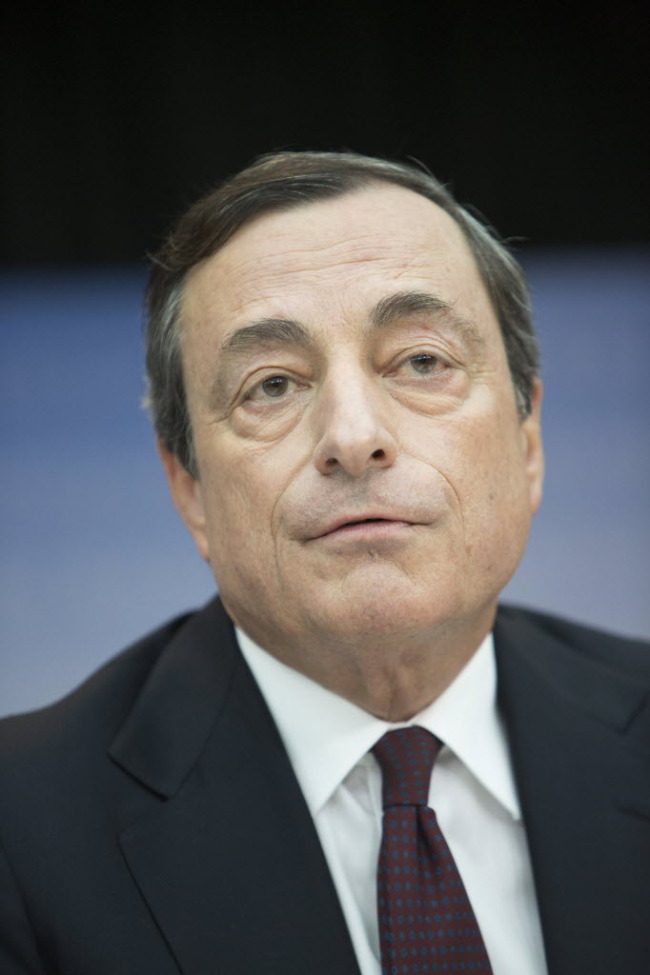FRANKFURT, Germany (AP) ― European Central Bank head Mario Draghi said Monday that a stronger euro would put at risk the shaky recovery in the 18 countries that use the shared currency.
Draghi made the remark to legislators in the European Parliament in Strasbourg amid worries that the modest rebound in Europe is stalling. Data showed industrial production fell by 1.1 percent in May in the currency zone.
A stronger euro would hurt export-dependent businesses. However Draghi offered no new steps to boost the economy beyond the raft of measures the bank announced on May 8. Markets shrugged off the remark and the euro traded little changed at around $1.36.
At that level, it is down from its 2014 peak of just below $1.40, its highest in 2 1/2 years.
 |
European Central Bank head Mario Draghi. (Bloomberg) |
Draghi said that while the bank does not target any particular exchange rate it would monitor the effect of any appreciation of the euro because that would affect the inflation rate, the bank’s chief policy target. He said that the exchange rate “remains an important driver of future inflation in the euro area,” adding that in the present context, an appreciated exchange rate is a risk to the sustainability of the recovery.”
Draghi gave little indication that the bank was ready to move beyond its current efforts to raise inflation and spur the economy. The ECB has raised the possibility of buying financial assets such as government bonds to pump new money into the economy. That would be aimed at raising the worrisome low rate of inflation of only 0.5 percent. And it could also weaken the euro’s exchange rate.
With the economy barely growing and not creating many jobs, politicians are piling pressure on the central bank. If needed, the ECB could further loosen its monetary policy through interest rate cuts or launch a monetary stimulus similar to those undertaken by the U.S. Federal Reserve and the Bank of England. Those programs involve injecting new money into the economy by buying large amounts of bonds and other financial assets.
Asked about asset purchases, Draghi referred legislators to statements from the bank’s previous meetings where it has said it is ready to deploy such unconventional tools if the inflation outlook worsens and prices levels do not eventually start rising toward the bank’s goal of just under 2 percent.
Some economists think Draghi and the ECB will be reluctant to go down that route, partly because of technical problems such as how to buy assets ― and which ones ― across a currency bloc comprising 18 countries. Draghi has said such a program, called quantitative easing or QE, is within the bank’s mandate and could be used if needed.
The International Monetary Fund on Monday added to the debate, saying the ECB should undertake a “substantial balance sheet expansion, including through asset purchases” if inflation fails to pick up.
The IMF suggested in its regular report on the eurozone economy that the ECB should buy its member states’ government debt to “reduce government bond yields, induce higher equity and corporate bond values, and ultimately raise demand and inflation expectations across the euro area.”
For now, Draghi is expected to resist the pressure.
“For the time being, it seems likely that Draghi will stick with attempting to talk the euro lower,” said Jane Foley, senior currency strategist at Rabobank International.
The calls on Draghi to do more may become more acute in the coming months if growth remains anemic and inflation, at 0.5 percent, stays below the 2 percent target.
The ECB has not sat on the sidelines in recent months. It is currently reviewing the finances of Europe’s largest financial groups and is planning to give them more cheap loans if banks lend more to businesses. It has also reduced its benchmark interest rate to a record low of 0.15 percent and set a negative rate for the deposits that banks keep at the central bank in the hope that pushes them to lend more. And it has extended its standing offer of unlimited short-term credit to banks into 2016.








